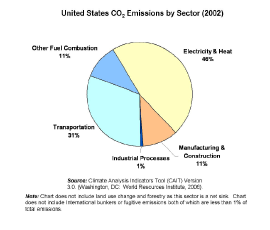Office Buildings Can Fight Global Warming, Says World Resources Institute Guidebook
Published 06-22-06
Submitted by World Resources Institute

WASHINGTON, D.C. - Most people associate global warming with industrial polluters. But people who work in office buildings can also significantly impact climate change by introducing energy-efficiency measures to improve building operations.
That is the major message in a how-to guidebook released today by the World Resources Institute (WRI) titled Hot Climate, Cool Commerce: A Service Sector Guide to Greenhouse Gas Management.
"If you're a building or operations manager at a bank, an insurance company or a retail chain, this guide lays out steps to measure greenhouse gas (GHG) emissions and implement solutions," said Samantha Putt del Pino, who co-authored the guide with WRI's Ryan Levinson and John Larsen.
Case studies in the report detail how service-sector companies have put programs in place to measure and manage their emissions and achieve energy savings. Among the companies profiled are Citigroup, General Electric, IKEA and Staples.
"Climate change is becoming a mainstream issue and is increasingly important to our employees and our customers," said Mark Buckley, vice president, Environmental Affairs at Staples. "WRI's tools have allowed us to manage our GHG emissions in a cost-effective manner - from providing guidance on our inventory to benchmarking our targets and purchasing renewable energy."
All companies contribute to climate change through their electricity consumption for office lighting, cooling, computers, building equipment, and appliances, as well as fuel use for heating, business travel, and the distribution of products and materials. Electricity and heat (46 percent) and transportation (31 percent) are the two largest U.S. sources of carbon dioxide, which is the most common GHG.
"The guide was a foundation for us," said Emma Wendt, footprint officer at the International Finance Corporation, the private-sector arm of the World Bank Group. "By working through the methodology, we developed quality data that supported the World Bank Group's commitment to go carbon neutral. The guide will prove an invaluable resource for companies who want to take action on climate change."
Reducing energy use and managing greenhouse gas emissions can also help build corporate value through competitive positioning, improved shareholder relations, and human-resource management advantages such as better recruitment and retention of employees.
"Because the potential impacts of climate change are likely to escalate over time as gases continue to accumulate in the atmosphere, it is crucial that steps to reduce emissions begin immediately," Putt del Pino added.
For a PDF of the entire guidebook, reprintable graphics, and other materials, journalists may visit http://newsroom.wri.org.
The World Resources Institute (www.wri.org) is an independent, non-partisan, and nonprofit organization with a staff of more than 100 scientists, economists, policy experts, business analysts, statistical analysts, mapmakers, and communicators developing and promoting policies that will help protect the Earth and improve people's lives.

World Resources Institute
World Resources Institute
The World Resources Institute (WRI) is an environmental think tank that goes beyond research to find practical ways to protect the earth and improve people's lives. Our mission is to move human society to live in ways that protect Earth's environment and its capacity to provide for the needs and aspirations of current and future generations. Because people are inspired by ideas, empowered by knowledge, and moved to change by greater understanding, WRI provides—and helps other institutions provide—objective information and practical proposals for policy and institutional change that will foster environmentally sound, socially equitable development. WRI organizes its work around four key goals:
More from World Resources Institute

